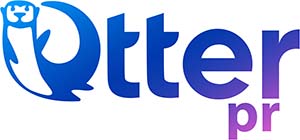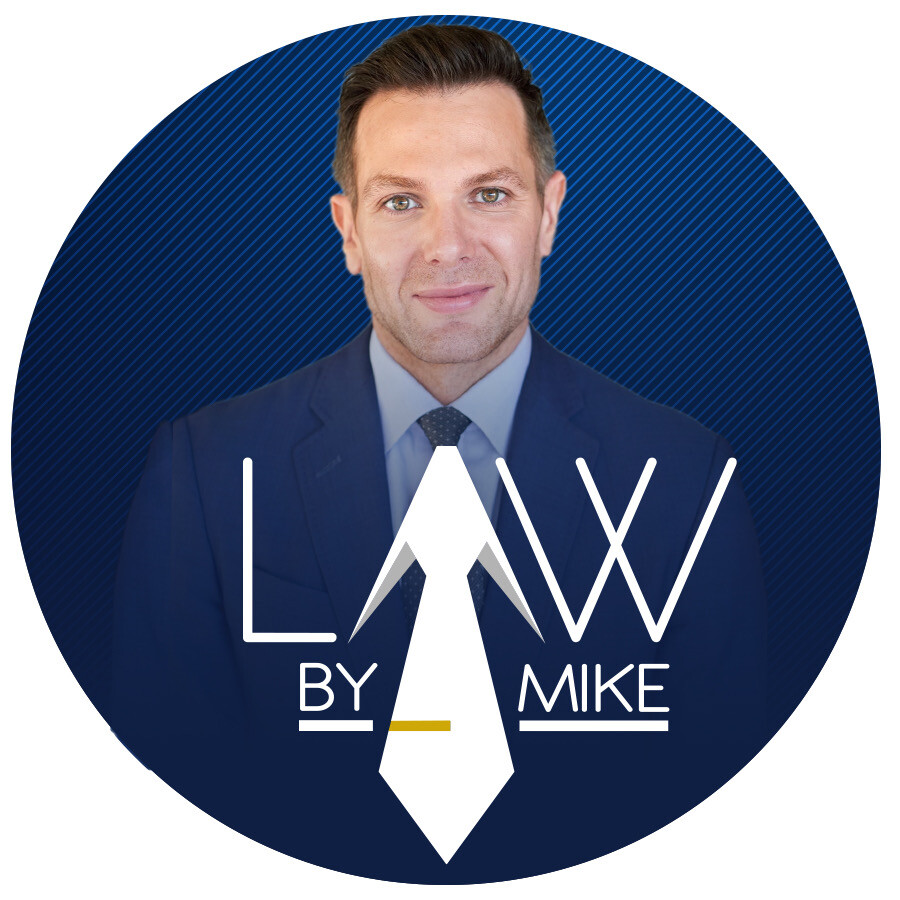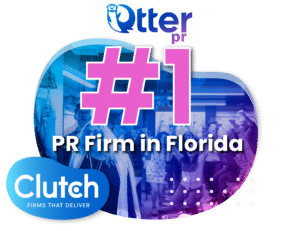In today’s fast-paced media landscape, effective communication is key. Whether you’re a budding entrepreneur or a seasoned executive, mastering media interaction can significantly enhance your public image and career trajectory. This comprehensive guide provides essential insights into media training, outlining its importance, who can benefit, and practical tips on media coaching for beginners and executives. Let’s embark on a journey to refine your media skills and elevate your public speaking prowess.
What is Media Training?
Media training is a specialized form of communication coaching that prepares individuals to interact effectively with journalists, handle interviews, and present themselves confidently in public forums. It encompasses a range of techniques, from managing body language and tone to formulating clear, impactful messages. Media training equips you with the skills to navigate the complex media environment with poise and professionalism.
The Critical Importance of Media Coaching for Beginners & Executives
In an era where public perception can make or break careers, media training stands as an invaluable tool. It helps mitigate the risks of being misquoted or misrepresented, ensuring your message is conveyed accurately and effectively. Here are some of the top reasons you should consider media training:
1. Enhanced Message Clarity
Media training sharpens your ability to articulate thoughts clearly and concisely, ensuring that your key messages are conveyed effectively and remembered by your audience.
2. Increased Confidence in Public Appearances
It builds confidence, empowering you to handle various media interactions, from interviews to public speaking, with greater assurance and poise.
3. Improved Crisis Management Skills
The training equips you to handle crisis situations effectively, enabling calm and clear communication under pressure, which is crucial for maintaining a positive public image.
4. Development of Authenticity
By learning to communicate your genuine thoughts and feelings, media training fosters trust and relatability with your audience, enhancing your overall public perception.
5. Understanding of the Media Landscape
It provides valuable insights into how the media works, helping you interact more effectively with journalists and adapt to different media formats, from traditional interviews to social media engagements.
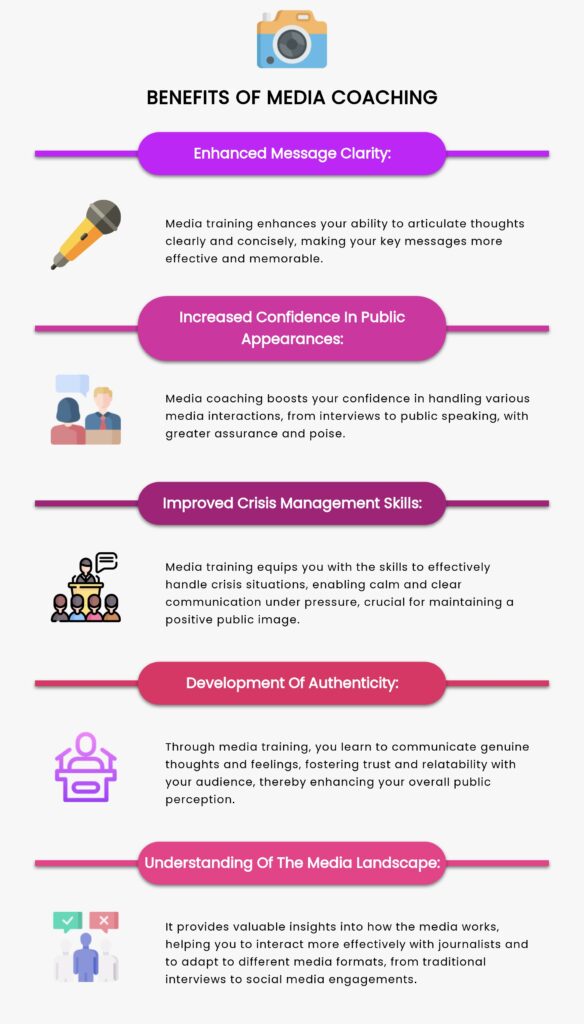
Who Benefits from Media Training: From Novices to Business Leaders
Media Coaching for Beginners: For individuals new to media exposure, training provides a foundation for managing nerves, crafting messages, and understanding the dynamics of media interactions. It’s an essential step in building a confident, media-savvy persona.
Media Training for Executives: Executives often face intense scrutiny. Media training for executives focuses on refining their message delivery, handling tough questions, and maintaining composure under pressure, which is essential for upholding a positive corporate image.
Ideal Events and Formats for Media Training: Tailored for Beginners and Executives
Navigating the media landscape requires skill and preparation, making media training essential for both beginners and executives. Whether it’s handling the intensity of a press conference, the scrutiny of a TV interview, or the spontaneity of social media, the right training can make a significant difference. Below, we explore various events and formats where media training is particularly beneficial, each tailored to enhance the capabilities of those new to media interactions and seasoned leaders alike.
Press Conferences
In press conferences, media training is invaluable in enhancing your ability to deliver clear, concise messages under the public spotlight. It teaches you how to effectively address a room full of journalists, manage unexpected questions, and maintain a composed demeanor. This setting is crucial for beginners to learn the ropes of public speaking and for executives to refine their message delivery and public image.
TV Interviews
TV interviews require a different set of skills, as they often involve on-camera dynamics. Media training prepares you for these interactions by focusing on effective non-verbal communication, such as eye contact, facial expressions, and posture. For beginners, this is a vital arena to build confidence on camera, while for executives, it’s an opportunity to project authority and approachability on screen.
Public Speeches
Public speaking is an art, and media training helps in crafting and delivering impactful speeches. It guides you in structuring your content to engage the audience, using storytelling techniques, and managing public speaking anxiety. For beginners, it’s a platform to develop a compelling speaking style, and for executives, it’s a chance to inspire and lead through powerful rhetoric.
Crisis Communication
Handling sensitive situations with tact and clarity is a critical skill taught in media training. It equips you to address negative incidents or public relations challenges effectively, maintaining your composure and delivering clear, controlled messages. Beginners learn to navigate these tricky waters, while executives can reinforce their leadership and crisis management abilities.
Social Media Interactions
In the digital age, social media interactions are an integral part of media engagement. Training in this area focuses on understanding the nuances of digital communication, crafting messages suitable for various platforms, and maintaining an authentic online persona. This is essential for beginners who are building their digital presence and for executives who need to align their online communication with their professional image.
In each of these settings, media training offers unique benefits, equipping both beginners and executives with the skills needed to excel in their public communications and media relations.
10 Tips on Media Coaching for Beginners
Navigating the world of media can be daunting for beginners, but with the right coaching, it becomes an opportunity for growth and effective communication. This section provides ten essential tips for those starting their journey in media interactions. These tips are designed to build foundational skills, enhance message delivery, and foster confidence in various media settings.
1. Identify and Understand Your Audience
Research your audience’s interests and backgrounds. Tailoring your message to their preferences makes your communication more impactful.
2. Ensure Clarity in Your Communication
Break down complex ideas into simpler, more digestible parts. This makes it easier for your audience to understand and remember your key points.
3. Engage in Regular Practice
Dedicate time to rehearse your presentations or speeches. Consistent practice refines your speaking skills and boosts confidence.
4. Consciously Manage Your Body Language
Use positive gestures and facial expressions to complement your verbal message. Effective body language enhances your overall communication.
5. Develop Techniques to Stay Calm
Learn and practice stress management techniques. Staying calm under pressure ensures clear thinking and a confident presentation.
6. Embrace and Convey Authenticity
Be true to yourself in your communications. Authenticity builds trust and connects more deeply with your audience.
7. Prepare for Potential Questions
Think about possible questions you may be asked and prepare your responses. This preparation shows competence and readiness.
8. Practice Active Listening
Show genuine interest in the questions asked. Active listening demonstrates respect and encourages open communication.
9. Maintain Focus on Your Core Message
Keep returning to your main points during discussions. This consistency helps reinforce your key message.
10. Actively Seek and Utilize Feedback
Request feedback from peers or mentors and use it for continuous improvement. Feedback is crucial for personal and professional growth.
10 Tips on Media Training for Executives
For executives, media training is not just about mastering communication; it’s about leading with influence and protecting your brand. In this section, we present ten advanced tips tailored for corporate leaders to refine their media engagement skills. These strategies focus on crafting compelling narratives, handling complex situations, and maintaining a strong executive presence across all media platforms.
1. Develop a Compelling Brand Narrative
Craft a story that aligns with your brand’s values and mission. A strong narrative connects emotionally with your audience.
2. Strategically Control Conversations
Guide discussions to emphasize your key messages. Controlling the agenda helps in delivering the desired impact.
3. Strategize for Handling Tough Questions
Prepare tactics for difficult inquiries. This preparation helps in maintaining composure and control during challenging interactions.
4. Incorporate Relevant Statistics Effectively
Use data to support your statements. Relevant statistics add credibility and weight to your arguments.
5. Master the Art of Non-Verbal Communication
Ensure that your body language is congruent with your words. Non-verbal cues play a significant role in persuasive communication.
6. Learn Bridging Techniques
Develop the skill to redirect conversations back to your main points. Bridging helps in maintaining focus on your agenda.
7. Prepare for Crisis Situations
Develop a crisis management strategy. Being prepared for adverse situations protects your brand’s reputation.
8. Understand and Adhere to Media Ethics
Familiarize yourself with ethical standards in media interactions. Ethical practices enhance trust and credibility.
9. Align Personal Branding with Corporate Image
Ensure your personal brand reflects your corporate role. Consistency in branding strengthens your professional image.
10. Commit to Continuous Learning
Stay updated with the latest media trends and techniques. Continuous learning is key to staying relevant and effective in media interactions.
What is the Role of a Media Coach?
A media coach is pivotal in the world of public relations and communication, equipping individuals, especially beginners and executives, with essential skills for media interactions. Their role encompasses everything from enhancing messaging techniques to guiding personal branding, which is key for success in the evolving media landscape.
What a Media Coach Helps With:
Embarking on media coaching involves mastering a variety of skills crucial for effective public interaction. A media coach offers invaluable support in areas like persuasive messaging, crisis communication, and interview tactics, enhancing your proficiency in media engagements.
Effective Messaging Techniques: A media coach teaches you how to craft and deliver clear, impactful messages, ensuring your key points are conveyed effectively to your audience.
Body Language Mastery: They guide you in using non-verbal cues like gestures and facial expressions to complement and reinforce your verbal communication.
Handling Difficult Questions: Coaches provide strategies for navigating challenging interviews and press questions, helping maintain composure and message control.
Message Development: They assist in developing a coherent and persuasive message tailored to your goals and audience, enhancing the impact of your communication.
Interview Tactics: Coaches train you in the art of giving engaging and effective interviews, covering aspects like tone, pacing, and content relevance.
Crisis Communication Skills: They equip you with skills to handle crisis situations, enabling clear, calm, and strategic communication under pressure.
Personal Branding Guidance: Media coaches help in aligning your communication style with your personal or corporate brand, ensuring consistency across all platforms.
What to Look For in a Media Coach:
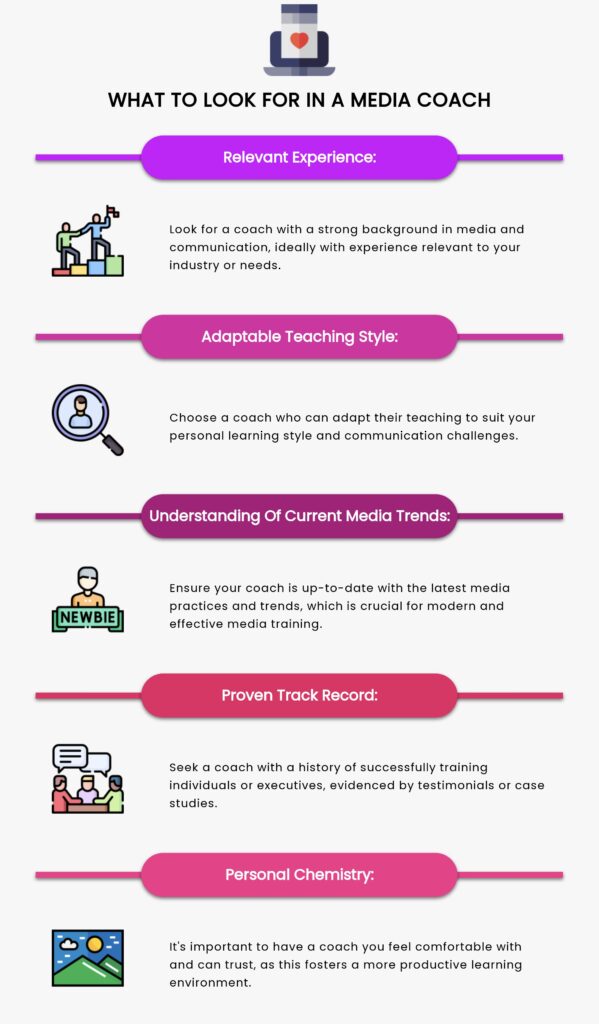
Choosing the right media coach is vital for impactful media training. Key considerations include relevant experience, an adaptable teaching style, and up-to-date knowledge of media trends, ensuring your training is both contemporary and aligned with your personal and professional goals.
Relevant Experience: Look for a coach with a strong background in media and communication, ideally with experience relevant to your industry or needs.
Adaptable Teaching Style: Choose a coach who can adapt their teaching to suit your personal learning style and communication challenges, whether you need media coaching for beginners or more advanced training for executives.
Understanding of Current Media Trends: Ensure your coach is up-to-date with the latest media practices and trends, which is crucial for modern and effective media training.
Proven Track Record: Seek a coach with a history of successfully training individuals or executives, evidenced by testimonials or case studies.
Personal Chemistry: It’s important to have a coach you feel comfortable with and can trust, as this fosters a more productive learning environment.
How Otter PR Provides Tailored Media Coaching for Beginners and Executives
At Otter PR, we specialize in media training tailored to your unique needs. Whether you’re starting out or an experienced executive, our expert coaches are equipped to refine your media skills. We offer personalized coaching sessions, real-world practice scenarios, and ongoing support to ensure you’re always prepared for the spotlight. Elevate your media presence with Otter PR’s comprehensive training programs.
Tags: business success, media relations, media training, PR, Public relations
